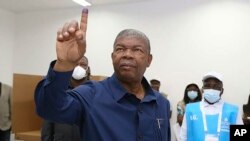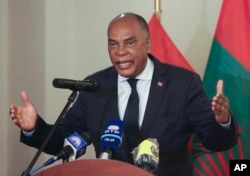Lawmakers met in the capital, Luanda, to decide whether to set up a parliamentary commission to examine a motion to remove Lourenco from office presented by UNITA, a former rebel group turned political movement that lost a disputed election last year.
But UNITA MPs walked out in protest crying "dictatorship, dictatorship!" ahead of the vote, after the ruling party pushed for a public ballot, which the opposition said should have been secret instead.
"We were invited to participate in a voting process that never happened," UNITA leader Adalberto Costa Junior told journalists after leaving parliament, accusing the ruling party of flouting parliamentary rules.
The proposal was then rejected with 123 votes against and one abstained.
"The impeachment process is absolutely closed. It was not well prepared," said Joao Martins, a spokesman for the ruling MPLA party.
UNITA had presented an almost 100-page-long motion to impeach Lourenco earlier this week after months of preparations.
It accused the 69-year-old of being authoritarian, breaking budget rules and corruption, among other things.
The opposition might have hoped to exploit divisions within the MPLA, but observers say the initiative was unlikely to succeed.
Removing the president requires a two-thirds majority vote in parliament and support from the courts -- and the MPLA, in power since 1975, controls both, analysts say.
Yet, the threat of impeachment was used to pile up pressure on the government amid popular discontent at poverty, corruption and a shaky economy.
Thousands of people called for Lourenco's removal at a UNITA rally in August after the party announced its plans.
The southern African nation has seen a series of protests since the government cut subsidies for petrol in June.
More than 100 people were arrested earlier this month after police said a demonstration in the east of the county turned violent.
The subsidies cut was aimed at curbing government spending, as the economy suffered from a slide in oil prices that weakened the local currency, the kwanza.
But it resulted in unpopular sharp fuel price hikes.
Under Angola's constitution, the president can be removed from office if he is considered to have committed acts that threaten democracy.
The MPLA had previously dismissed UNITA's efforts to remove the president as "unserious" and "undemocratic."












Forum